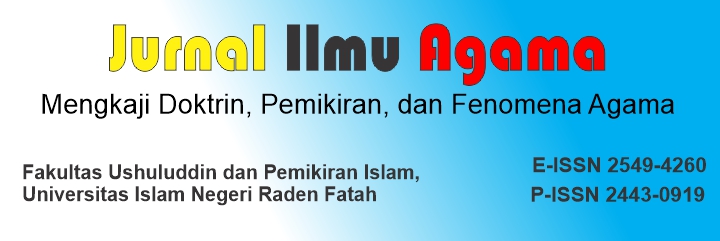KRITIK NALAR ISLAM SEBAGAI METODE IJTIHAD : MEMBAHAS PEMIKIRAN MOHAMMED ARKOUN
Main Article Content
Abstract
Rational criticism of Islam that developed Arkoun in studying a problem or not text other is to get the "real substance" which may be knocked out, forgotten, or even not at all unthinkable, with the approach of linguistic, psychological, historical, and social and cultural anthropology. By referring to the style of thought Derrid, Paul Ricour, Michael Foucault, Pierre Bordue, in the field of language, Arkoun reveal diversity not previously seen and not said in the text. With the demolition was he trying to find the meaning of which is lost or created by the freezing process that afflicts thought Islam.Dengan deconstruction allows the things that have not occurred or even unthinkable to be revealed can be revealed. By restoring the purity of the teachings in accordance with the objectives desired by God (author). The primary objective reasoning criticism of Islam is to free thought of all sorts of images and imagery narrow, because it is not possible for Islamic reason to think clearly for such images still lingering in their reasoning. Rational criticism of Islam also aims to distinguish between revelation and history, transcendent revelation to restore the position of the original. This refund because they said there was a reduction in the value it contains after experiencing intermingling with human history (ideological, political, and interests). Here we need the critical stance, against all kinds of teologisme Islam (including all branches epistimologi like: fiqh, tafsir, the science of kalam, Aqeedah, and so on). Because after all, all it is a human creation as well, and we are entitled to put it on the table criticism.
Article Details
Authors who publish with this journal agree to the following terms:
- Authors retain copyright and grant the journal right of first publication with the work simultaneously licensed under a Creative Commons Attribution 4.0 International License that allows others to share the work with an acknowledgement of the work's authorship and initial publication in this journal.
- Authors are able to enter into separate, additional contractual arrangements for the non-exclusive distribution of the journal's published version of the work (e.g., post it to an institutional repository or publish it in a book), with an acknowledgement of its initial publication in this journal.
- Authors are permitted and encouraged to post their work online (e.g., in institutional repositories or on their website) prior to and during the submission process, as it can lead to productive exchanges, as well as earlier and greater citation of published work.
How to Cite
References
Arkoun, Al-Fikr al-Isla: Qiraat Ilmiah , Beirut,Markaz al-inma al-Arabi, 1987
_______, Min al-Ijtihad Illa Naqd al- Aql al-Islami, Beirut: Dar Al Saqi, 1993
_______, Rethinking Islam:Common Question, Uncomon answers, Oxford: Westview Press, 1994
_______, Tarikhiyyah Al-Fikr Al- Arobi Al-Islami, Beirut: Markaz Al-Imna’ al-Qaumy, 1986
Assyaukanie, Luthfi, Islam Dalam Kontek Pemikiran Pasca modernism: Pendekatan menuju Kritik Akal Islam,UQ,1994
Binder, Leonard, Islamic Liberalism, A Criticque of Development Idiologies, Chicago: University Of Chicago Press, 1988
D.Lee, Robert, Overcoming Tradition and Modernity, The Search for Islamic Authenticity, Colorado : Westview Press,1997
Hidayat, Komaruddin, Tragedi Raja Midas, Moralitas Agama dan Krisis Modernisasi, Jakarta: Paradikma,1998
Iqbal, Muhammad, The Reconstruction of Relegious Thought in Islam,Lahore,Muhammad ashrak, 1986
Meuleman, John Hendrik, Tradisi Kemodernan dan metamodernisme; Memperbincangkan Pemikiran Muhammad Arkoun, Yogyakarta: LKIS, 1996
Mohammmad Arkoun, Nalar Islam dan Nalar Modern: Berbagai Tantangan dan Jalan Baru, Ter. Rahayu S Hidayat, Jakarta: 1994
Putro, Suadi, Mohammed Arkoun Tentang Islam dan Modernitas, Jakarta: Paradikma, 1998

